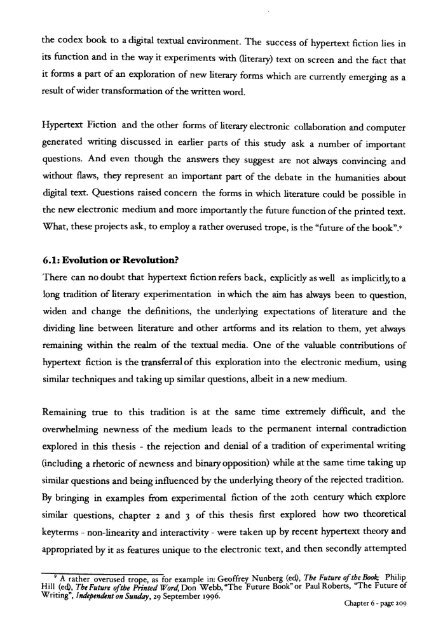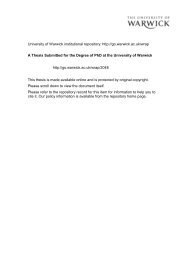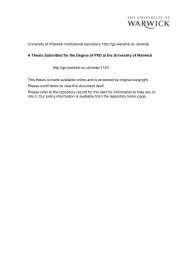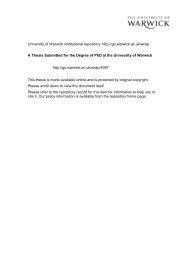From Page to Screen - WRAP: Warwick Research Archive Portal ...
From Page to Screen - WRAP: Warwick Research Archive Portal ...
From Page to Screen - WRAP: Warwick Research Archive Portal ...
You also want an ePaper? Increase the reach of your titles
YUMPU automatically turns print PDFs into web optimized ePapers that Google loves.
the codex book <strong>to</strong> a digital textual environment. The success of hypertext fiction lies in<br />
its function and in the way it experiments with (literary) text on screen and the fact that<br />
it forms a part of an exploration of new literary forms which are currently emerging as a<br />
result ofwider transformation ofthe written word.<br />
Hypertext Fiction and the other forms of literary electronic collaboration and computer<br />
generated writing discussed in earlier parts of this study ask a number of important<br />
questions. And even though the answers they suggest are not always convincing and<br />
without flaws, they represent an important part of the debate in the humanities about<br />
digital text. Questions raised concern the forms in which literature could be possible in<br />
the new electronic medium and more importantly the future function ofthe printed text.<br />
What, these projects ask, <strong>to</strong> employ a rather overused trope, is the "future ofthe book".'<br />
6.1: Evolutionor Revolution?<br />
There can no doubt that hypertext fiction refers back, explicitly as well as implicitly,<strong>to</strong> a<br />
long tradition of literary experimentation. in which the aim has always been <strong>to</strong> question,<br />
widen and change the definitions, the underlying expectations of literature and the<br />
dividing line between literature and other artforms and its relation <strong>to</strong> them, yet always<br />
remaining within the realm of the textual media. One of the valuable contributions of<br />
hypertext fiction is the transferral of this exploration in<strong>to</strong> the electronic medium, using<br />
similar techniques and taking up similar questions, albeit in a new medium.<br />
Remaining true <strong>to</strong> this tradition is at the same time extremely difficult, and the<br />
overwhelming newness of the medium leads <strong>to</strong> the permanent internal contradiction<br />
explored in this thesis - the rejection and denial of a tradition of experimental writing<br />
(including a rhe<strong>to</strong>ric ofnewness and binaryopposition) while at the same time taking up<br />
similar questions and being influenced by the underlying theory ofthe rejected tradition.<br />
By bringing in examples from experimental fiction of the zoth century which explore<br />
similar questions, chapter 2 and 3 of this thesis first explored how two theoretical<br />
keyterms - non-linearity and interactivity - were taken up by recent hypertext theory and<br />
appropriated by it as features unique <strong>to</strong> the electronic text, and then secondly attempted<br />
9 A rather overused trope as for example in: Geoffrey Nunberg (ed), The Future ofthe Book; Philip<br />
Hill (ed), The Future ofthe PrintedWort/, Don Webb, "The Future Book"or Paul Roberts, "The Future of<br />
Writing", Independent onSunday, 29 September 1996.<br />
Chapter 6 - page 209





